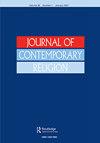Normalisation of nonreligious identity in Finland
IF 0.6
3区 哲学
0 RELIGION
引用次数: 1
Abstract
ABSTRACT Based on representative survey material analysed with the help of Multiple Classification Analysis (MCA), this article examines nonreligious identification in Finland. It focuses on those who positively identify themselves as nonreligious, describes them according to selected social variables, and explores their attitudes. The results demonstrate that nonreligious identity is more prevalent among Millennials and even more so among urban men. An examination of attitudes towards minority religions, church–state interaction, and national pride shows that the nonreligious are relatively liberal and tolerant, but what makes them different from others is their opposition to church–state interaction and their lack of national pride, thus indicating the weakening of ‘cultural religion’. On the basis of these findings, this article argues that in addition to the general process of secularisation, national history and recent social changes offer plausible reasons for the questions of how and why such normalisation is taking place, especially among Millennials.芬兰非宗教身份的正常化
摘要本文以具有代表性的调查资料为基础,运用多重分类分析法(MCA)对芬兰的非宗教认同进行了研究。它关注那些积极地认为自己是非宗教的人,根据选定的社会变量对他们进行描述,并探讨他们的态度。结果表明,非宗教身份在千禧一代中更为普遍,在城市男性中更是如此。对少数宗教、政教互动和民族自豪感的态度的考察表明,非宗教人士相对自由和宽容,但使他们与其他人不同的是他们反对政教互动和缺乏民族自豪感,从而表明“文化宗教”的弱化。在这些发现的基础上,本文认为,除了世俗化的一般过程之外,国家历史和最近的社会变化为这种正常化如何以及为什么发生的问题提供了合理的理由,特别是在千禧一代中。
本文章由计算机程序翻译,如有差异,请以英文原文为准。
求助全文
约1分钟内获得全文
求助全文
来源期刊

Journal of Contemporary Religion
RELIGION-
CiteScore
1.20
自引率
0.00%
发文量
59
期刊介绍:
Journal of Contemporary Religion is an international peer reviewed journal. Its purpose is to both document and evaluate the anthropological, sociological, psychological, and philosophical aspects of emerging manifestations of religiosity in any part of the world—whether within innovative movements or mainstream institutions. The term ''religion'' in the title of this journal is understood to include contributions on spirituality. Moreover, as the journal title suggests, the focus is on contemporary issues. Therefore, the editors of Journal of Contemporary Religion welcome submissions which deal with: classical topics in the study of religion, such as secularisation and the vitality of religion or traditional sectarian movements; more recent developments in the study of religion, including religion and social problems, religion and the environment, religion and education, the transmission of religion, the materialisation and visualisation of religion in various forms, new forms of religious pluralism, the rise of new forms of religion and spirituality, religion and the Internet, religion and science, religion and globalisation, religion and the economy, etc. theoretical approaches to the study of religion; discussions of methods in relation to empirical research; qualitative and quantitative research and related issues. The Journal includes reviews of books which reflect the above themes.
 求助内容:
求助内容: 应助结果提醒方式:
应助结果提醒方式:


